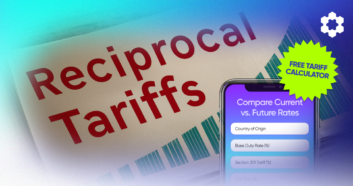In June 2021, the US Congress introduced new antitrust legislation that has the potential to change Amazon’s business model.
Antitrust laws protect competition among businesses, provide choices for consumers, and permit the government to intervene when competition is threatened. The bill, titled the American Innovation and Choice Online Act (AICO), will allow the government to challenge a number of self-preferencing, anticompetitive practices by top tech companies that include Amazon, Google, Facebook, Microsoft, and more if passed.
Changes to the Amazon platform could mean changes for your business. As the bill makes its way through Congress, knowing potential outcomes will be crucial to sellers’ long-term success.
In this article, we’ll discuss the proposed antitrust bill, its current status in Congress, and how it may impact both Amazon and your FBA business.
What does the antitrust bill solve for Amazon sellers?
The primary purpose of the American Innovation and Choice Online Act is to curb anti-competitive practices of some of the country’s largest tech companies. Specifically, it is intended to stop them from giving themselves unfair advantages over competitors who use their platforms to reach customers. In the case of Amazon, this could be you — an Amazon business owner.
If you have ever expressed frustration at Amazon’s promotion of their own products such as AmazonBasics, the American Innovation and Choice Online Act is made to protect you, a seller, against this self-preferential behavior.
According to Brookings, “The legislation authorizes the Federal Trade Commission, the Department of Justice, and state attorneys general to challenge self-preferencing by online platforms of a certain size, as defined in terms of annual sales, market cap, or active users. Amazon would be covered.”
Law Violations Under AICO
If you are familiar with calls to “break up Big Tech,” this bill is one of the first pieces of legislation to address those concerns. If passed, federal and state authorities will be able to sue qualifying platforms for certain violations. Here’s a summary of the practices that are grounds for government action:
- The platform giving its own products (ex. AmazonBasics wall outlets) preference or advantages over competing businesses.
- Limiting the ability for sellers to compete with the platform’s own products by other means.
- Discriminating among “similarily situated” businesses.
- Restricting the ability for sellers to access or operate within the platform or its operating systems while maintaining its own products with ease (unless this poses a cybersecurity risk).
- Requiring the purchase of other products or services to be able to sell on the platform.
- Using private data obtained from customers of third-party sellers to support sales of the platforms’ own products.
- Restricting the ability of third-party sellers to use customer data to compete off of the platform.
- Blocking users from uninstalling preinstalled software or changing default settings that direct customers to the platform’s products. Exceptions for cybersecurity also apply here.
- Interfering or restricting sellers’ pricing of their products.
- Restricting the ability for sellers to communicate information or provide hyperlinks to customers.
- Restricting or impeding a seller or their customers from interoperating or connecting to a product or service.
- Manipulating search or other functionalities to showcase or preference the platform’s products over sellers’.
- Retaliating against anyone who, in good faith, files a complaint with federal or state authorities about potential law violations.
As with most judicial proceedings, the government must prove that a platform named in a complaint is following any of the actions above. This means that these restrictions are not fully banned, as Amazon (or any other company) has the right to defend and justify their actions in court.
What is the bill’s current status in Congress?
AICO was first introduced in the House Committee on the Judiciary in June 2021. Members of the committee voted to advance the bill, but as of now it has not received a floor vote in the House of Representatives.
The Senate Judiciary Committee also held a vote to advance the legislation in January, passing it 16-6. As of August 2022, it also has yet to receive a floor vote in the Senate.
What’s next for the proposed legislation?
The precise date of a vote on AICO is uncertain. While lawmakers expected a vote in the Senate to take place in early summer, bringing the vote to the floor is dependent on Senate Majority Leader Chuck Schumer. It is unknown if the bill has the 60 votes needed to pass in the Senate, but support and sponsorship from both Democratic and Republican Congress members could give it an advantage when it reaches the floor.
Congress will be in recess in August, so if a vote doesn’t take place in the coming weeks, it may happen in the months leading up to the midterm elections. It is also worth noting that the bill is endorsed by the Department of Justice, which indicates support from the Biden administration as well.
What does passage of the law mean for Amazon?
Passage of AICO could mean changes for the Amazon platform. However, the extent of those changes are still unclear.
Amazon executives believe the legislation will throw its ability to run its marketplace into jeopardy as well as shutter or reduce the scope of its Amazon Prime benefits, cutting its wide selection, low prices, and 2-day delivery service. The company also claims that its success has made it the primary (and unfair) target of the bill.
Other marketplaces such as Walmart, Target, and Costco are not covered under AICO because they do not reach the market cap of $550 billion. The bill’s creators, Senators Amy Klobuchar (D) and Chuck Grassley (R), claim that Amazon’s success is not only success, but is dominance that has made it anti-competitive.
The most direct consequence of AICO is that Amazon will not be allowed to prefer its products over others by awarding them with Best Seller or Amazon’s Choice badges or intentionally listing them at the top of search results. However, as mentioned earlier, the violations in AICO are not outright banned.
If complaints are brought to the government, Amazon (or any other platform), has a number of defenses they can use to justify their policies or actions. Some violations also have exceptions for cybersecurity risks.
What does it mean for Amazon sellers?
Changes for your FBA business largely depend on the passage of AICO.
Some argue that changes to the Amazon platform means bad news for sellers. This, however, is not fully factual. The intent of AICO is to increase or allow better competition on Amazon, not to destroy the platform.
With that said, third-party sellers make up more than half of Amazon’s retail volume, so their concerns must be addressed, ideally before (if) the bill is passed.

Any impacts of AICO’s passage must be dealt with head-on by Amazon if they do not want major disruptions to their business. Meeting challenges with innovation should be the way of any modern company.
Amazon and Antitrust Laws: What’s Next?
Though the American Innovation and Choice Online Act has yet to be passed by the Senate or signed into law, there are potential implications for the Amazon platform and, therefore, your FBA business.
Amazon has lobbied to Congressmembers and reached out to its seller community to encourage them to oppose the bill by reaching out to their Senators. However, before directly opposing or approving of the proposed legislation, we recommend doing your best to understand the bill and reflecting on your experience as an Amazon seller.
Are you satisfied with the current state of the platform? Has your experience selling on Amazon been positive or could there be improvements? Whatever you decide, we also recommend contacting your Senator to express your concerns.
In the meantime, we’ll be looking out for AICO-related information and keep you updated on final outcomes.




